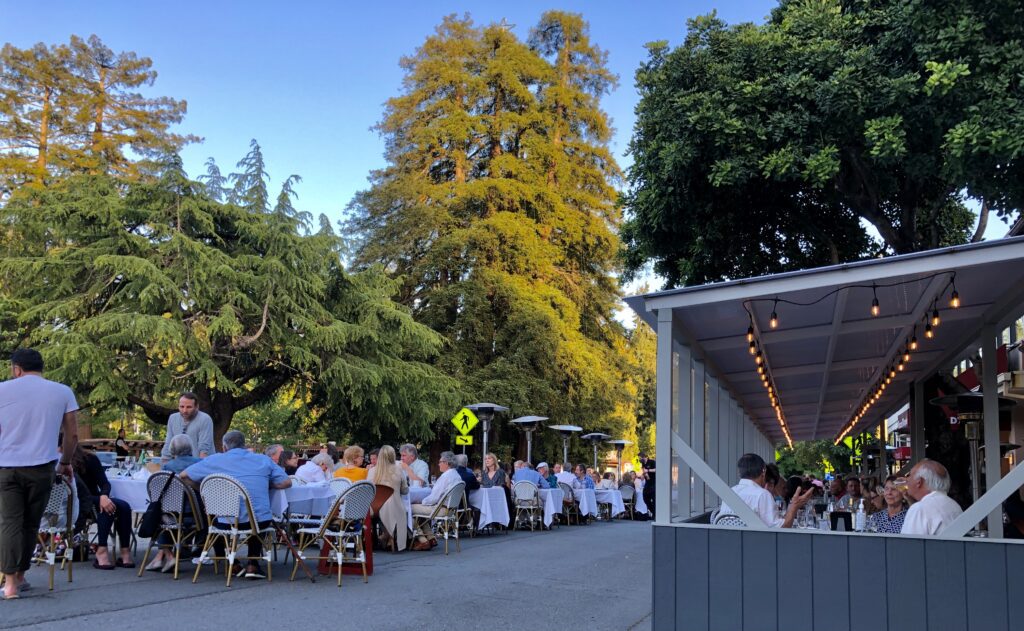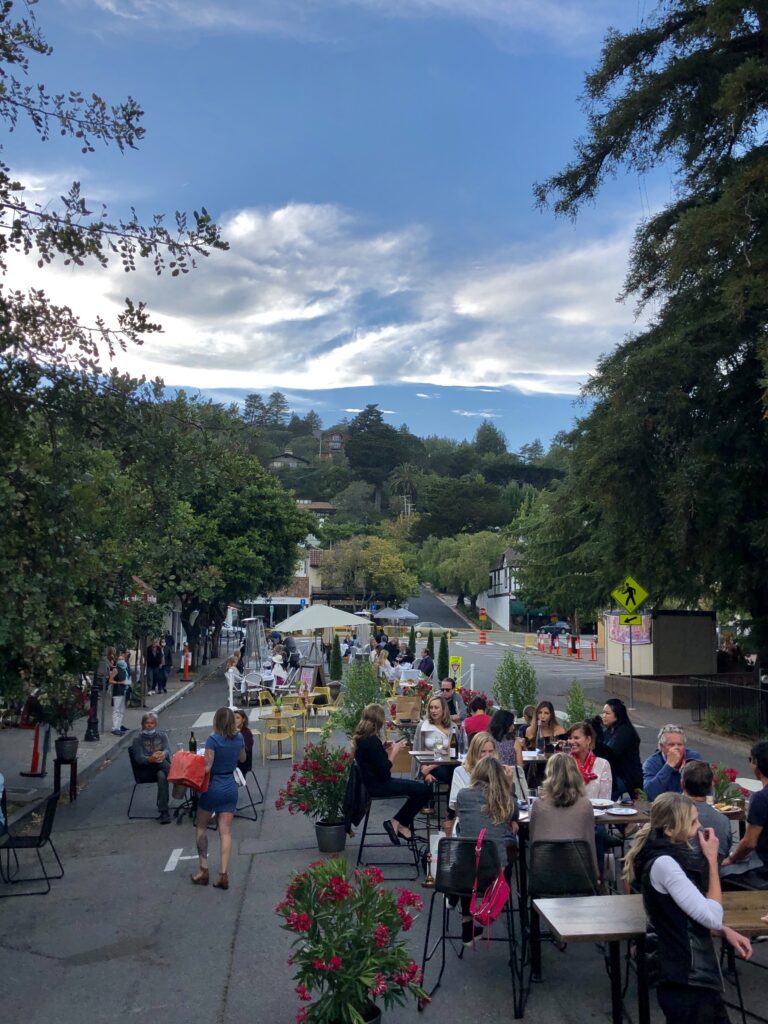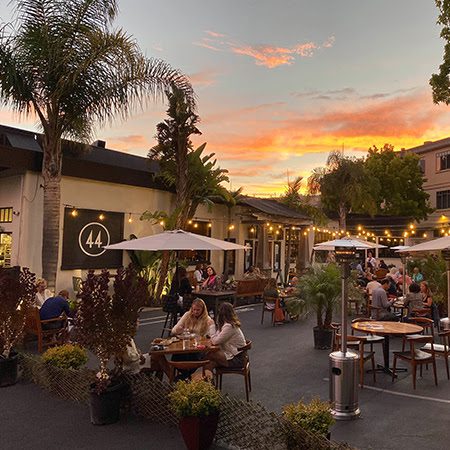

In 2021, as City officials continued to navigate a seemingly endless series of forced closures and restrictions on how brick and mortar businesses and nonprofits could function amidst the pandemic, creativity and innovation became indispensable.
With the backing of the City Council and the dogged support of the Mill Valley Chamber, City Manager Alan Piombo seized the moment. He dove deeply into collaboration with his colleagues across the county and led the drafting of a broad policy framework that became a safety net for innovation through the next many months, with great ideas blossoming all over town.
The result – a ministerial approval system for the private use of both public and private spaces – was trailblazing. Restaurants embraced the thrill of outdoor dining. Fitness facilities repurposed any outdoor space they could find to host workouts. Hair and nail salons pampered their clients in the open air. Al fresco, everywhere.
Within one of the most vaccinated communities in the country, we’re at a very different place than in those interim years. But the community’s appetite, in particular for outdoor gathering and dining, remains as insatiable as ever.
Despite that popularity, outdoor use of public and private spaces have been a lightning rod of sorts as governments across the Bay Area have struggled to find the right balance of regulation and creative experimentation, and strike a balance between the popularity of outdoor gather and the desire for retailers to not be negatively impacted by it, particularly as it related to parking.
As it juggled the community’s strong desire for outdoor use with councilmembers’ goal of what they see as a return to normalcy, the council, after backing several extensions due to Covid-19 turbulence, voted unanimously in April to end the existing outdoor business use program on Oct. 31. Despite regular and deep engagement with city officials, the Mill Valley Chamber failed to convince the council that limiting the program to certain months would be both unpopular to consumers and likely limit the future applications given the need to takedown parklets and related outdoor infrastructure each year.
The Chamber repeatedly urged the creation of a long term outdoor use plan, drawing on best practices nationwide— and the continuation of the current temporary program until then. In 2021, the Chamber submitted a lengthy report on best practices for outdoor use in the Bay Area, drawing on successful programs for all stakeholders.
That means that ALL infrastructure related to outdoor use, both public and private, must be taken down by Oct. 31. In its place, the council backed a seasonal program that spans May to October. All businesses which seek to use public space in 2023 – Piazza D’Angelo and Equator Coffees are the only two currently doing so – would have to take down their existing structures and re-apply well in advance of the May reopening of outdoor business use. Both have indicated that it is cost prohibitive to set up and take down through each phase of the program.
When the new program begins in May 2023, every business seeking to be part of the program would have to reapply. Heaters and umbrellas would be allowed, but roofs, walls or tents or permanent structures of any kind would not. Structures “must sit on a leveling platform and be easy to remove and create minimal visual impact,” according to city officials. The city’s program would not be available to salons, gyms or any other non-restaurant business unless limited to merchandise displays.
Some councilmembers expressed openness at the time to expanding the seasonal dates and others wondered if it was premature to make any explicit changes to the municipal code.
“This is something the community loves and it has made Mill Valley better than it has been in the past,” Councilmember Urban Carmel said, noting that the seasonal program “could grow over time to become a bigger program.”
“We are deliberating a program, not a continuing experiment,’ then-Mayor John McCauley said. “My sense is that we give clear guidance that we wrap this thing up so we don’t hear from the Chamber every three weeks. I vote for a code change that is decisive and finished.”

Private Property Restrictions
As a result of the council’s unanimous decision and the Mill Valley Chamber’s unsuccessful lobbying for an alternative outcome, the city is paring back the ability of a business to use its private parking spaces for anything but parking if it reduces the amount of parking allotted to that property under its conditional use permit.
That impacts four businesses directly, each of whom had the consent of their property owner to use private property to expand their footprint outside. That includes Bungalow 44’s tent, TamalPie’s use of space adjacent to its covered dining patio, The Cantina’s use of a portion of its parking lot for outdoor seating and Gravity Tavern’s use of part of Miller Lane. As a practical matter, each of the aforementioned businesses could only create outdoor dining by moving onto city streets and going through the new program’s application process.
Each of those businesses have a requisite number of parking spaces associated with the Conditional Use Permit for that business. The new program would prohibit that private use of private space if it reduced the parking allotted to that property.
At the April hearing, Piombo told the council that “in order to make zoning changes, the Planning Commission would need to review those changes prior to them coming back to council for adoption. But there would be no open or ongoing deliberation over what the program would look like.” That hearing is set for Tuesday, August 23 at 6:30pm.
There remains no clear pathway for the aforementioned businesses located on private space to use more private parking spaces than those allowed under its current conditional use permit.
City officials reminded business owners that the City’s existing Outdoor Dining Areas and Outdoor Merchandise Displays program remains in place, giving businesses like Joe’s Taco Lounge and The 2am Club the ability to apply for the use of the public right-of-way immediately adjacent to the business frontage, but not the use or obstruction of parking areas and driveways. This program is distinct from the Outdoor Business Program. There is also a sidewalk dining application process.
Other Cities and Towns
Those who’ve followed the use of outdoor space during the pandemic know that every city and town has had their own process and outcome.
San Rafael approved its outdoor dining program in June, Sausalito is working through its own long-term parklet proposal and Novato is looking to allow more downtown parklets. San Francisco went through its own process in December, making parklets permanent but then added so many rules that many restaurants planned to tear them down. Three months later, city officials made a u-turn, passing an ordinance to delay issuing fines for non-compliant parklet structures under its permanent Shared Spaces parklet program until April 1, 2023. Even some of the most successful outdoor dining and parklet programs in Marin, like San Anselmo, has faced pushback from retail shop owners who believed too much had been granted to outdoor use. Others, like Fairfax, have extended their parklet program with some refined regulations that seek to address safety concerns and better sightlines.
Here’s the Planning Commission Agenda.
You can submit a letter in advance at cityclerk@cityofmillvalley.org.
Submit an eComment during the hearing, which begins at 6:30pm on Tuesday, Aug. 23.

The outdoor dining provided is more for local patrons. Is Mill Valley still considered a destination place for tourists to come?
In my humble opinion outdoor dining should be kept in some instances to help some of the restaurants